Skip to main content
2019 Toyota Avalon First Drive Review: A new hope
2019 Toyota Avalon First Drive Review:
A new hope
A revamped segment benchmark still leads the way
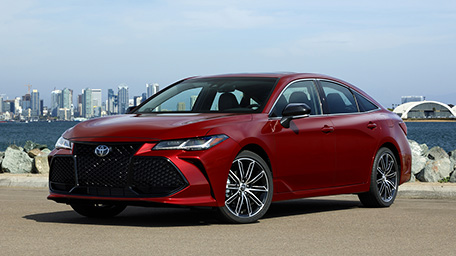
If the 2019 Toyota Avalon
isn't fit enough to survive, then the entire full-size sedan species is
doomed to extinction. It's really simple as that, because as the
new-and-improved replacement for a car that was already well-entrenched
as the segment benchmark, it stands the best chance of coaxing customers
away from an onslaught of SUVs and similarly priced smaller sedans with
fancier badges. Perhaps it could even snag a few people not yet old
enough to collect Social Security.
That last point is key, because at 64 years old, the current Avalon's average buyer is actually a few years older
than the segment average. While there's certainly nothing wrong with
building a car for retirees, one must also acknowledge that fixed
incomes and well, the inevitable march of time, will erode your customer
base even more than it has (from about 71,000 when the current
generation was introduced to about 32,600 in 2017). So, while Toyota isn't trying to capture young buyers, knocking a few years off that average would be nice.
To do that, Toyota has diversified the Avalon lineup, continuing its
recent trend of offering variants of differing style and driving
experience. There are a pair of "premium" trim levels, the XLE and
Limited, and "sport" trim levels, the XSE and Touring. Visually, XLE and
Limited models get horizontal bars and grey trim accenting the absurdly
large grille, brighter trim, and a pair of trapezoidal tailpipes (the
Hybrid's are hidden). Inside, there are warmer color combinations,
including the Touring's distinctive "Cognac" leather accented by genuine
wood trim from Yamaha. That would, presumably, be the Yamaha piano
people as opposed to the sportbike or snowmobile divisions.
The Avalon XSE and Touring are the trims targeting younger buyers, and
possibly those looking to upgrade from the current crop of surprisingly
involving midsize sedans (including the Camry
SE and XSE). That pair's gaping maw is done up in a textured mesh
finished in gloss black, which also adorns the wing mirrors, rear lower
valance, added lip spoiler and "Avalon" badging. There are also quad
pipes and snazzier wheels.
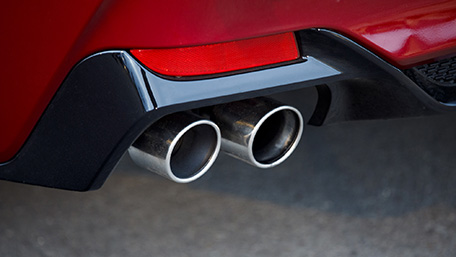
The sporty trims present a compelling overall look that doesn't seem
contrived or the equivalent of your dad coming out of Hollister with a
new wardrobe. The rear of both variants is particularly sharp (the
sculpted taillights are pretty cool), while the shapely hip line, thinly
tapered C pillar and profile in general are quite fetching. It's
evocative of the new Lexus LS, though that shnoz manages to make Lexus' signature Spindle Grille seem subtle.
There's more than just visual differences, though, as each of the four
trim levels has different tuning of the MacPherson strut front and new
multi-link rear suspension. Handling precision was improved for the XLE
and Limited (every Avalon benefits from a stiffer structure, thicker
stabilizer bars and a lower center of gravity), but comfort remains the
priority and the new suspension setup yields a suppler ride. Supple it
most certainly is, yet floaty it doesn't seem to be. Joe and Esther P.
Avalon Buyer should be quite happy.
The Limited's springs are 25-percent stiffer than those of the XLE,
while stabilizer bar stiffness increases by 20 percent front and 86
percent rear when going from XLE to XSE. It's a difference you can
immediately feel when driving the XSE, which has a more solid, hunkered
down feel than both the premium Avalon trims and other full-size sedans.
It's actually more in keeping with the Nissan Maxima,
which is another mainstream entry with premium aspirations and pricing.
That it still manages to have full-size sedan dimensions certainly
gives it a leg up on the Maxima – as does its superior steering.
Indeed, every 2019 Avalon impresses with its steering's precision and
natural effort. The latter is actually a little heavier than expected – a
pleasant surprise for some, perhaps a concern for the arthritic crowd –
but still fine at lower speeds. Like the rest of the Avalon driving
experience, especially with the sport trims, it feels like it belongs to
a normal, involving car instead of an aloof isolation machine. In fact,
selecting the car's Sport mode only slightly increases effort to the
point that it's only noticeable when really pushing hard (and who's
really doing that in an Avalon?). There's no forearm-challenging heft
just to make things seem sporty. Good.
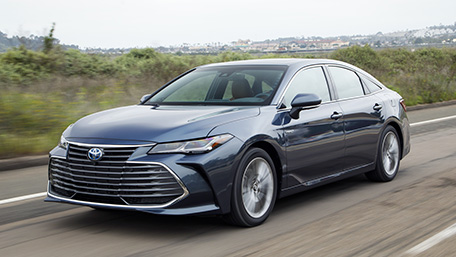
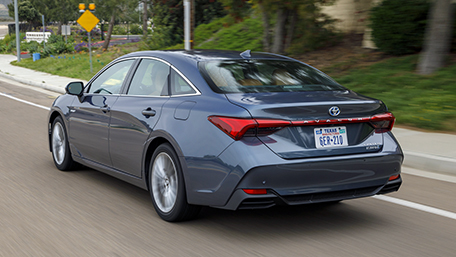
At the top of the dynamic pile is the Touring, which adds to the XSE's
suspension adaptive variable dampers that, in typical fashion,
constantly adjust themselves based on road conditions and allow the
driver to choose among Normal, Sport, and Sport+ driving modes to
achieve their ideal ride/handling balance. Normal basically adds extra
comfort to the XSE's standard settings (which lets you feel a surprising
amount of the road, perhaps even too much), while the Sport and Sport+
settings get firm enough to be a bit unpleasant on rough pavement. They
do, of course, keep the car flatter around corners and provide a
generally sharper driving experience. We're not sure if that's really
necessary for any buyer of an Avalon, but hey, why not?
The Touring also sounds different. It gets a sport exhaust with modified
baffles for a more noticeable warble during acceleration, but then
engineers added an active noise control system that cancels out some
resulting unwanted noise. There's also an intake sound generator and
fake noise piped in through the speakers. Frankly, it didn't sound that great and seems rather pointless.
Attached to that exhaust, and indeed every 2019 Avalon trim, is the same
3.5-liter V6 and 8-speed automatic combo introduced in the new Camry.
Producing the same 301 horsepower and 267 pound-feet of torque, it moves
the 3,560 - 3,704-pound Avalon with expected ease. That's a significant
upgrade of 33 hp and 19 lb-ft compared to the 2018 Avalon. Its
horsepower is only bettered in the segment by the Buick LaCrosse and Chevy Impala, but those both weigh more. (Yes, there's the Hemi-powered Chrysler 300, but that's a real outlier).
Yet, the best Avalon powertrain choice could be the Hybrid. Possessing
virtually the same styling and chassis tuning as the V6-powered trims
(minus the unavailable Touring), the Hybrid pretty much differs only
under the hood. Oh, and under the back seat, where the nickel-metal
hydride battery has migrated to from under the trunk. Not only does this
mean the Hybrid has the same 16.1 cubic-feet of trunk space as
V6-powered models (the old one was 14 cu.ft. versus 16), it relocates a
considerable amount of weight from beyond the rear axle to forward of it
and down low. That improves the center of gravity, and although we
didn't get to push any version hard enough to really notice, if the
similarly set-up 2018 Camry Hybrid is any indication, the Avalon Hybrid may ultimately be the more balanced car to drive.
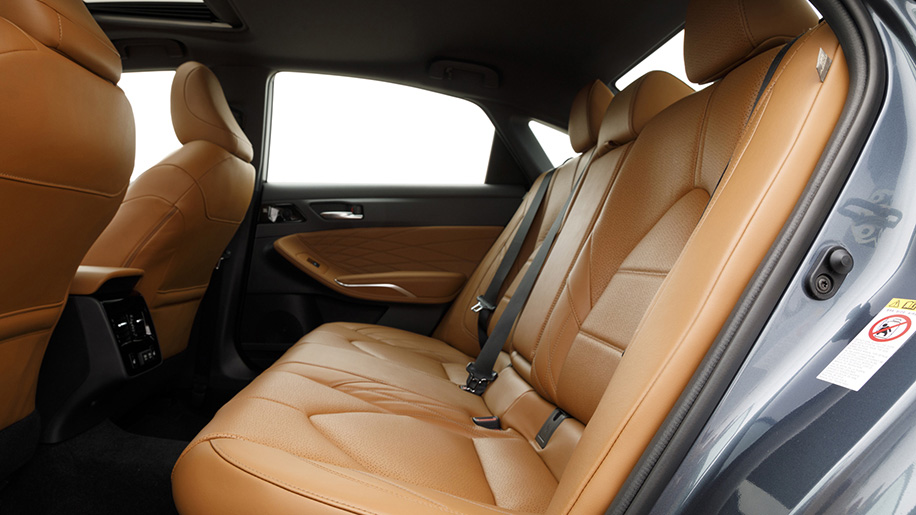
That's only a happy side effect, though. The V6 may manage best-in-class fuel economy
of 25 or 26 miles per gallon combined (depending on trim), but it's
shellacked by the Hybrid's 43 or 44 mpg figure (the outgoing hybrid
got 40 mpg). That could easily translate into annual fuel savings of at
least $600 – huge when you consider the 2019 Avalon Hybrid is only
$1,000 more than the equivalent gas-only model. That's an unparalleled
payback time for a hybrid.
Sure, the system's combined output of 215 hp is obviously less than the
V6, but its acceleration is sufficient and an added motor for 2019
(which basically frees the drive motor from other duties) adds a bit
more electric juice into the equation when starting off. This eases the
load on the 2.5-liter, 176-hp four-cylinder and prevents some of the
uncouth mooing and vibrations of other Toyota hybrids.
The interior sees an increase in style and quality over what already
exceeded its competitors in both measures. The old design also looked
quite a bit like the new Camry's, but the 2019 version goes its own way
with a tall, rectilinear center stack that rises forth from the center
console and seems to hover away from the rest of the dash like a
free-standing tower. It's kinda cool and avoids the tacked-on iPad look
many dislike, while still benefitting from the reduced visual bulk and
elevated sightline that design allows. The area behind it is
architectural in appearance, neatly integrates the air vents, and
showcases different materials. Perhaps there's a bit too much going on,
though, especially in the Touring's Cognac cabin, and the tower's
"supports" are an unconvincing hard plastic knock-off of the squishy
dashtop above.
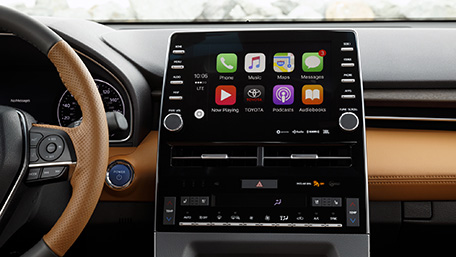
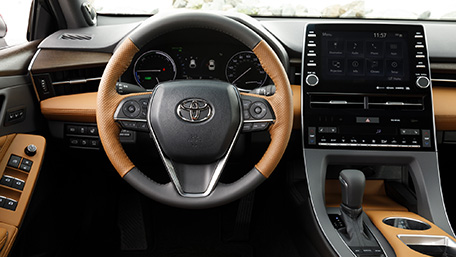
The tower itself features new, unique-to-Avalon switchgear that
maintains Toyota's longstanding preference for keeping the climate
control system separate from the infotainment (kudos). The latest Toyota
Entune 3.0 system comes standard with a 9-inch touchscreen, WiFi, five
USB ports, satellite radio, Amazon Alexa integration, and, for the first
time in a Toyota, Apple CarPlay. The company said it will add Android
Auto should customers demand it, but we're guessing it's trying to iron
out a comparable agreement with Google as it did with Apple that
prevents customer data from being transferred back to headquarters in
Cupertino (which was apparently the hold-up for adding CarPlay).
Other features include Toyota's Safety Sense suite of accident avoidance
and driver assistance tech, including full-speed cruise control,
lane-keeping assist and automatic emergency braking with pedestrian
detection. LED headlights, dual-zone climate control, heated power front
seats and SofTex vinyl that's far more convincing in the Avalon than
other Toyota products are standard. Equipment levels soar from there to
genuine luxury levels on the Limited and Touring trims. Pricing starts
at a not-insignificant $36,395 for the XLE then goes up to $38,895 for
the XSE, $42,695 for the Limited and $43,095 for the Touring. Options
are basically limited to an audio upgrade on lower trims and a parking
tech upgrade on upper ones. Every Avalon is built in Kentucky.
Whether all of this is enough to stem the deluge of customers from
full-size sedans is really anyone's guess. The current Avalon is still
the class leader, isn't as dowdy as past versions and the 2019 isn't
exactly a revolutionary makeover. Then again, maybe the jazzier sport
trims really will attract some quinquagenarians and bring down that
average age. They'll at least be getting a better car.







Comments
Post a Comment